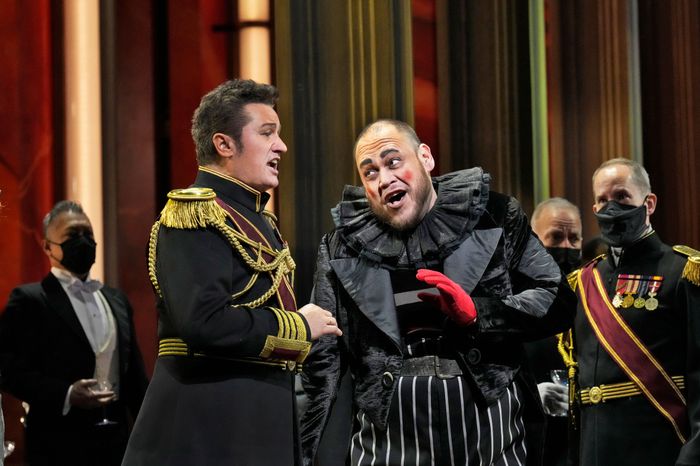
When an opera director wants to reinterpret a classic, the easiest bit of the libretto to discard is often the first stage direction, stating where and when it takes place. There’s something about shunting a 19th-century opera to Las Vegas, say, or 1964, that auteurs find irresistible. Some works resist that kind of migration with plot points and musical references that don’t travel well. Rigoletto, though, was born on the move. Although Verdi and his librettist Francesco Maria Piave originally set it at the court of the 16th-century French king Francois I, they smuggled it past censors by renaming the characters and resetting it a couple of generations later in the provincial court of Mantua. That in turn left Bartlett Sher, who directed the new Metropolitan Opera production, with a justification to pack it up again and take it wherever he chose. He landed in Weimar Germany, a land satisfyingly full of cruelty, debauchery, black-leather trench coats, and prostitutes with crimson wigs. Fortunately, once Sher had taken care of his quota of clichés, he got back to the human drama and the incandescent music, binding them with more nuance and freshness than the concept implied.
A New Year’s bout of COVID forced me to miss the first run of performances but did help me appreciate how miraculous it is that the Met, with multiple operas and thousands of cast members, stagehands, chorus members, costumers, lighting technicians, and others sharing the same backstage air, has managed to keep soldiering on. There may be a constant low-grade panic coursing through the house, but it wasn’t evident onstage, where Michael Yeargan’s slow-twirling set (slipping from gaudy castle to dank house to dive), a chorus of thuggish courtiers, Donald Holder’s nimble lighting, and that perpetually awkward stage business involving a burlap sack all clicked smoothly along. Conductor Daniele Rustioni kept the orchestra sounding effervescent and fleet, honoring that unquenchably Verdian mixture of nastiness and entertainment. Sher and Rustioni made it clear they understand that, despite all the humiliation the title character endures and the ranging vindictiveness it triggers, Rigoletto is a tragedy that brings audiences joy.
The key to the production, though, isn’t a directorial masterstroke but the casting of Quinn Kelsey, a baritone who’s been singing at the Met for more than a dozen years. We first see him trudging across the stage in pinstriped pants and a top hat, like a grotesque banker from a George Grosz painting. With his big shoulders, big jaw, and his great, shiny Half Dome of a head, Kelsey gives Rigoletto immense presence even before he opens his mouth. When he does, out comes a richly human creature, sincere in his love, fiery in his resentment, implacable in his rage. The character’s extremes can often lead to caricature. It must be tempting to deliver his snarl at the duke’s enablers, “Cortigiani, vil razza dannata,” like an acid spray from a Iagolike psychopath. Or to declare his fatherly tenderness as if it poured from a completely different soul. Kelsey linked his chain of hit arias into a consistent, if complicated, person, blessed with tunefulness and warmth.
Kelsey’s musical sophistication — the way he booms without bellowing, gives buoyancy to a legato phrase, finds his way into the conductor’s plastic beat — is what separates a tragic figure from a pathetic one. The louche duke and his band of bullies, the soulless assassin Sparafucile and his grim sister Maddalena, even the soppily self-sacrificing Gilda, all see Rigoletto as a sad figure practically asking to be crushed. Kelsey lets the audience in on his nobility, thrashing to get out.
The other principals — Piotr Beczala as the duke, Rosa Feola as Gilda, Andrea Mastroni as Sparafucile — supported Kelsey without upstaging him (a particular danger for the tenor tossing off “La donna è mobile”). They will make their exits once this first run winds down at the end of the month, and a mostly new cast will assemble when the production returns in May. Fortunately, Kelsey will be there still, in all his grumbling grandeur.





